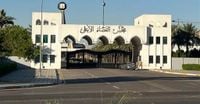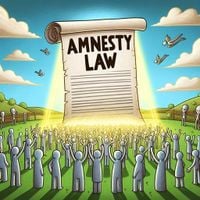In a sweeping move that has sent ripples through Iraqi society and the international community alike, Iraq’s Supreme Judicial Council announced the release of more than 35,000 prisoners from detention centers and prisons across the country. This mass release follows the implementation of a newly amended general amnesty law, a measure designed to address the chronic overcrowding of Iraq’s penal system and respond to mounting political pressures for broader clemency.
The numbers are staggering. According to the latest official statistics released on October 6, 2025, a total of 35,203 inmates were freed in September alone, as reported by the Supreme Judicial Council and corroborated by Shafaq News and the Associated Press. The law’s reach extends even further: nearly 144,000 additional individuals—including those detained pre-trial, out on bail, or facing arrest warrants and in-absentia sentences—are now eligible for release or exemption under its provisions. This represents one of the most significant amnesty efforts in Iraq’s recent history.
The roots of this policy go back to January 2025, when the Iraqi Parliament passed a revision to Law No. 27 of 2016. The amended law was formally implemented on February 6, 2025, following directives from the judiciary to apply the new, more inclusive guidelines. The legislation was designed to relieve the country’s severely overcrowded prisons, which, according to the justice minister’s comments in May, held about 65,000 inmates—despite being built to accommodate only half that number.
The amnesty law covers a wide range of offenses, including corruption, theft, drug use, and, more controversially, certain terrorism-related crimes. However, the law explicitly excludes those convicted of murder and the most serious terrorism offenses, particularly those involving killings. As the Supreme Judicial Council clarified, "The law excludes those convicted of terrorism, murder, and other serious crimes but allows thousands serving lighter sentences to walk free." This careful distinction, officials say, is intended to balance the need for justice with humanitarian and political considerations.
The implementation of the law has also had a notable financial impact. Courts have recovered 38.5 billion Iraqi dinars (about $27 million) in the last month alone, along with $34.3 million in restitution from those included in the measure. These recovered funds, largely from individuals convicted of theft and corruption, represent a significant windfall for the state at a time when Iraq continues to grapple with economic challenges.
Yet, the law’s passage and its aftermath have not been without controversy. The measure was spearheaded by Sunni lawmakers, who argued that their communities were disproportionately targeted by terrorism charges, often based on confessions they claim were extracted under torture. The law includes a provision that allows some individuals convicted of terrorism charges to request retrials if they can demonstrate that their confessions were coerced. As AP reported, "Among provisions of the new law is that some people convicted of terrorism charges can ask for a retrial if they assert that their confessions were taken under duress while in detention."
Supporters of the law contend that such measures are necessary to correct past injustices and to prevent the further marginalization of communities that have long felt targeted by Iraq’s anti-terrorism apparatus. They argue that the law is a step toward reconciliation and healing after years of sectarian conflict and insurgency. Sunni lawmakers, in particular, have championed the law as a means to address what they see as systemic bias and abuse in the justice system.
However, critics have raised alarm bells, fearing that the amnesty could open the door for the release of individuals associated with the Islamic State group and other extremist organizations. As Devdiscourse highlighted, "Critics, meanwhile, express concerns over the potential release of individuals associated with the Islamic State." Human rights groups have also voiced concerns, not just about the amnesty itself but about Iraq’s broader record on the death penalty and secret mass executions. The new law halts executions, a move that some see as progress, but others worry it may be temporary or insufficient to address deeper systemic issues.
Despite these concerns, the Supreme Judicial Council has not provided a detailed breakdown of the charges faced by those released under the amnesty, leaving some questions unanswered. What is clear, however, is that the law’s impact is already being felt across the country. The Ministry of Justice confirmed that, as of September 29, 2025, 9,410 prisoners had been released from correctional facilities in Baghdad and other provinces, with the numbers continuing to climb as the law’s provisions are implemented nationwide.
The amnesty law’s passage and enforcement mark a significant moment in Iraq’s post-conflict evolution. It is a policy born out of necessity—responding to the dire conditions in the country’s prisons as well as to the complex political realities of a nation still healing from years of war, occupation, and insurgency. As AP and Shafaq News both noted, the law is seen by many as a pragmatic solution to an urgent humanitarian problem, even as it stirs debate about justice, security, and the rule of law.
Looking ahead, the broader implications of the amnesty remain to be seen. Will the law foster greater social cohesion and trust in Iraq’s justice system, or will it lead to new security challenges and political tensions? For now, the release of more than 35,000 people stands as a testament to the country’s efforts to navigate the delicate balance between justice, mercy, and stability. The coming months will reveal whether this bold experiment in amnesty delivers on its promises or deepens the divisions it seeks to heal.



